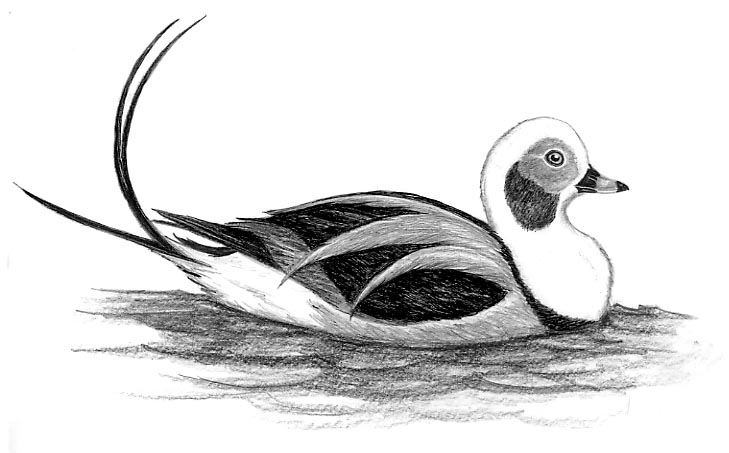
Dear Bird Folks,
A running joke in our family revolves around the bird that is called “Oldsquaw.” We don’t know anything about the bird, but we saw a picture of it one day and have been laughing about the name ever since. Are Oldsquaws found in our area or are they an exotic bird from some distant part of the world? Also, where did that odd name come from?
-Marci, Douglas, MA
Bad news Marci,
The joke is over. The bird, whose name gave your family so much pleasure, is no more. Just a mere ten years ago, many thousands of happy, healthy Oldsquaws could be found off the Massachusetts coast. Today, there isn’t a one left. In fact nobody, anywhere, has seen one of these birds since….since their name was changed to “Long-tailed Duck” a few years ago. The bird is fine, only its name has gone extinct. Once the Oldsquaw realized people in Douglas were making fun of it, it knew it was time for a new identity. Can you blame it?
Most of the time when a bird’s common name is changed, everyone is annoyed. We are all comfortable with the old name and changing a common name only creates confusion, not to mention instant panic for the people who print the bird books. A change is not even good for the bird in question. Usually its status suffers by the change. When the dignified “Myrtle Warbler’s” name was changed to “Yellow-rump Warbler,” the poor little birds took an embarrassing social step backwards. The birds used to hear excited birders say “look the at the myrtles” and now they have to listen to them say “check out those rumps.” It’s been quite an adjustment for the tiny birds. However, this is not the case for the Oldsquaw.
Long-tailed Ducks (aka Oldsquaw) are sea ducks, very handsome, but noisy sea ducks. They almost never shut up. Early ornithologists somehow decided that they sounded like a bunch of bickering, aged, Native American women. Since political correctness wasn’t very popular during the pioneer days, they were allowed to call the bird “Oldsquaw” and nobody stopped them. By the simple act of naming one duck, our first naturalists were able to insult Native Americans, women and the elderly. A perfect trifecta of insults. Oh, and by the way, with this duck, it is the males that do most of the yapping. The women were totally innocent.
Due to the above reasons, and the fact that the same bird is called “Long-tailed Duck” in Europe, it was decided that the unique, but inappropriate name of Oldsquaw, had to go. It is a move that thrilled the PC crowd, pleased the birds and went largely unnoticed by the Europeans. The name, Long-tailed Duck, fits perfectly. Both sexes are beautifully marked, but the males are the ones with the signature long tail feathers. Everybody should take a minute to look at a picture of this duck and see what we’re are talking about. This is not some bland, brown female mallard here. These sea ducks are visually striking. Go ahead, look them up, you won’t be disappointed.
As for the other part of your question, are they found around here? The answer is, oh my goodness yes. Although by “around here” I don’t mean Douglas, because we all know there isn’t much going on in Douglas. You will have to go to the coast to find these ducks. But we are not talking about any old coast, you should go to the coast of Nantucket. The waters off of Nantucket are a magnet for Long-tailed Ducks. Hordes of theses moving ducks create one of most spectacular natural events that you’ll see anywhere.
During the day Long-tailed Ducks feed in the rich waters of Nantucket Shoals. At sunset the birds take off and head off to roost in nearby Nantucket Sound. By standing on Cisco Beach at sunset, you could see thousands of these ducks fly past. When I say thousands, I don’t mean a few thousand ducks, I wouldn’t waste your time with that. On one day during this past Christmas bird count, over 330,000 Long-tailed Ducks flew past the observers. Now that’s impressive. And the best part is that this event happens during the winter, which is the off season in Nantucket. That’s when things will only cost you four times more than they should.
If you don’t feel like going island hopping, occasionally long tails show up in other locations. This year a few pairs have been spotted in Wellfleet and Provincetown Harbor. You should check them out, Marci, but you are no longer allowed to make jokes about their name. And while your’re at it, could you not make jokes about the Yellow-rumped Warblers either. Man, I feel bad for those guys.